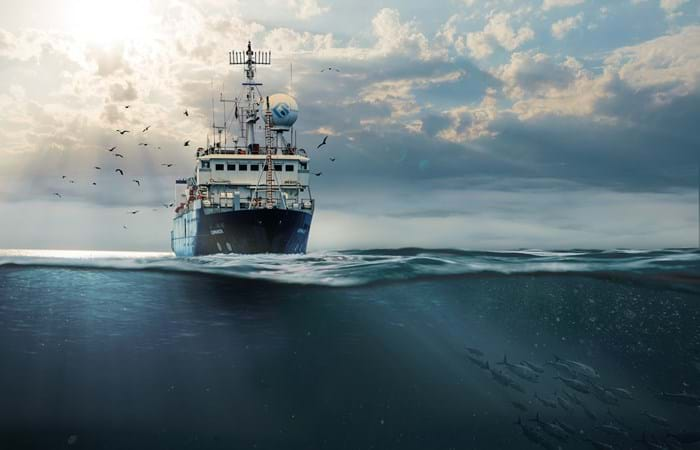From Great Yarmouth to the Great Barrier Reef. Steven Rick started his career with Gardline as a Cadet 15 years ago and it has taken him to places that most of us can only imagine. Steven is now a Project Manager for Gardline. Here is his story.
How long have you been at Gardline and how did your career start?
I joined Gardline in October 2005, but it could all have been so different. I was an Air Cadet in Caister, with the intention of joining the RAF. The Captain of the Sea Explorer, a vessel owned by Gardline, used to visit our unit and give lectures focusing on navigation. I spoke with him about my future and where I would like to go, and he suggested I consider going to sea instead of the RAF. In July that year I finished college and was invited in for an interview to join Gardline as a Deck Cadet. After a successful interview, I started college in Fleetwood, Blackpool in October.
The beauty of a cadetship is you get time away, get paid for it, learn from hands on experience and finish with an HND and a Certificate of Competency to sail as an Officer on any type of vessel.
How does a Cadetship work?
You can either do Deck, Engineering or an Electro-Technical cadetship. It’s sponsored by the Government’s SMarT Funding Scheme, so the education doesn’t cost the cadets anything and the whole process is managed by a training company, in my case Ship Safe Training Group (SSTG). I chose to be a Deck Cadet and my Cadetship was a 3-year course, split into different phases of college time and sea time. You need 12 months sea time and end up spending around 18 months in college in total, and the rest of the time you spend at home with your family and friends. It’s good how they split the cadetship up over phases as it changes it up between college and sea time, so you’re never bored. Living away from home at college and offshore also gives you the chance to mature and learn things you wouldn’t at home or in a normal office job, as you are doing your own thing and you have to look after yourself.
What happened once you finished your Cadetship?
After successful completion of my Cadetship, I became a Second Officer. I collected my qualifications from college, said goodbye to my friends there and returned home, ready for work with Gardline. I was very excited, but also nervous as I was no longer a Cadet and had more responsibility. For my first job as Second Officer, I was placed on the Sea Trident, which was doing some survey work in Angola, Africa. My primary job was keeping charge of the navigational watch, along with maintaining the vessel’s navigation charts and firefighting and lifesaving equipment. I went on to be a Second Officer for 6 years, participating in many projects and gaining experience and learning a lot.
What happened after that role?
After 6 years as a Second Officer, I joined the ISM (Integrated Safety Management) Department.I didn’t think I was going to stay in the office. After an offshore stint, I used some of my leave time to go over some of the systems and forms that were then in place for offshore staff, with the aim to improve them and provide the ISM Department with a Second Officer’s perspective of what was in place. I initially sat with the ISM Department for 2-months, before going back offshore. After some more time offshore, I was asked to join the ISM Department, to which I happily obliged. A few months later, an opportunity came up for me to go to Australia for 4-weeks to help Gardline Australia with their ISM system. I ended up staying in Australia for 12 months running the ISM and HSSE Department over there. This role personally gave me the most satisfaction and experience. We used to maintain and repair the navigational buoys in the water and were also responsible for emergency towage on the Great Barrier Reef. If any vessel was in danger of hitting the reef, we would send our vessel to tow it to safety.
I returned from Australia and then decided to take my Chief Mates/Masters certificates at college, which took around 12 months of studying. After I had attained the certificates I went back and worked in the ISM department full time for 6-months. I left the ISM department shortly after and became a Vessel Superintendent. I stayed in this role for 1year and I thoroughly enjoyed it. I was planning dry docks and maintenance periods. The last job I carried out as Superintendent was the intermediate dry dock of the Kommandor in the Netherlands. That was a massive achievement, running that whole docking as it was a big task. The vessel itself ended up having a huge amount of steelwork carried out on it, way over and above what was initially planned on there. It took a lot from everyone, but the job was carried out successfully by all involved.
You’ve worked both onshore and offshore. How do they compare?
I personally think offshore is a great way of life, although it is not for everyone. You get good leave-to-work ratio, which is nice, usually 2 months on, 2 months off as an Officer; you can plan your life around it. You save a lot of money when you’re away at sea as it’s more difficult to spend it, so that’s good. Working offshore, I’ve learned more than I ever would in an office. It’s a completely different experience to just going in to the office in the morning and going home in the evening. You’re working and living with the same people, for at least 28 days at a time and you end up making amazing friends.
Onshore work also has its benefits for me. It is quite eye opening when all you’ve ever done is work offshore, and once again, it is not for everyone! Similar to offshore, there are some very talented and dedicated people working in the office, and you can learn so much from them.
Have you got any advice for people looking to start a cadetship after college?
It’s a great career and can be very rewarding so would definitely recommend it. It can get tough at times, especially in the early stages of being a cadet, just because it’s so different to anything you’ve done before, especially if you are starting out at 16 or 18, but you need to stick through it. The first few months were the hardest for me as I was going away from home for the first time, so there were challenges there, although you find in college everyone is in the same situation so it you end up supporting each other along the way. When you go offshore you can potentially be one of the youngest people on the vessel, so it can be quite intimidating. As long as you are keen and eager to learn and show that, the time at sea is where you will learn all of your practical skills for the job. The senior Officers onboard the vessels will take you under their wing and support you, as they’ve been through the process themselves at the beginning of their career.
The adventures only just begun
Get in touch with us to find out how you can kick start your career with a Cadetship at Gardline.





